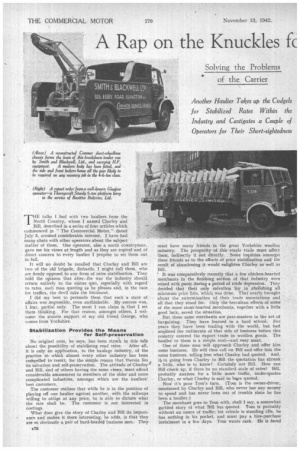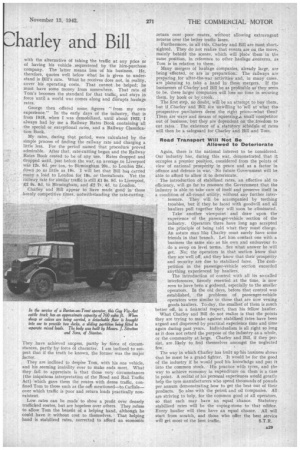A Rap on the Knuckles ft
Page 30

Page 31

If you've noticed an error in this article please click here to report it so we can fix it.
LNovember 13, 1942. harley and Bill Another Haulier Takes up the Cudgels for Stabilized Rates Within the Industry and Castigates a Couple of Operators for Their Short-sightedness THE talks I had with two hauliers from the North Country, whom I named Charley and
Bill, described in a series of four articles which commenced in "The Commercial Motor," dated July 3, aroused considerable interest. I have had many chats with other operators about the subject matter of them. One operator, also a north countryman. gave me his views at length and as they are topical and of direct concern to every haulier I propose to set them out in full.
It will no doubt be recalled that Charley and Bill are two of the old brigade, diehards, I might call them, who are firmly opposed to any form of rates stabilization. They hold the opinion that after. the war the industry should return entirely to the status quo, especially with regard• to rates, each man quoting as he pleases and, in the race for traffics, the devil take the hindmost.
I did my best to persuade them that such a state of affairs was impossible, even unthinkable. My success was, I fear, partial only. The most I can claim is that I set them thinking. For that reason, amongst others, I welcome the sincere support of my old friend George, who comes from Yorkshire.
Stabilization Provides the Means
for Self-preservation No original note, he says, has been struck in this talk about the possibility of stabilizing road rates. After all, it is only an application, to the haulage industry, of the practice to which almost every other industry has been coriipelled to resort, for the simple reason that therein lies its salvation and self-preservation. The attitude of Charley' and Bill, ind of others having the same views, must afford considerable amusement to members of the older and more complicated industries, amongst which are the hauliers' best customers.
The customer realizes that while he is in the position of playing off one haulier against another, with the railways willing to oblige at any price, he is able to dictate what the rate shall be. The customer is not interested in costings.
What does give the story of Charley and Bill its importance and makes it more interesting, he adds, is that they are so obviously a pair of hard-headed business men. They must have many friends in the great Yorkshire woollen industry. The prosperity of this staple trade must affect them, indirectly if not directly. Some inquiries amongst these friends as to the effects of price stabilization and the result of abandoning it would enlighten Charley as well as Bill.
' It was comparatively recently that a few chicken-hearted merchants in the finishing section of that industry were seized with panic during a period of trade depression. They decided that their only salvation lay in abolishing all minimum price lists, which was done, That nearly brought about the extermination of their trade associations and all that they stood for. Only the hercnlean efforts of some of the more stout-hearted merchants, together with a little good luck, saved the situation.
But these same merchants are' past-masters in the art of bargaining. They have learned in a hard school. For years they have been trading with the world, hut had acquired the rudiments of that side of business before this country entered the export trade in woollen goods. The haulier to them is a simple soul—and easy meat.
One of these men will approach Charley and offer him some business. He will then call on Bill and offer him the same business, telling him what Charley had quoted. And, ifg in going from Charley to Bill the quotation has shrunk a little, who is to know? Certainly not Bill. How can Bill check up, if there be no standard scale of rates? Bill, probably anxious for a little more traffic, under-quotes Charley, or what Charley is said to live quoted.
Now it's poor Tom's turn. (Tom is the owner-driver, mentioned by Charley and Bill, who' neverhas any money to spend and has never been out of trouble since he has been a haulier.) The merchant goes to Tom with, shall I say, a somewhat garbled story of what Bill has quoted. Tom is probably without an ounce of traffic; his vehicle is standing idle, he has nothing in his pocket, and must pay a hire-purchase instalment in a few days. Tom wants cash. He is faced
with the alternative of taking the traffic at any price or of having his vehicle sequestered by the hire-purchase company. The latter means loss of his business. He, therefore, quotes well below what he is given to understand is Bill's rate. What he receives does not, in reality, cover his operating costs. That cannot be •helped; he must have some money from somewhere. That rate of Tom's becomes the standard for that traffic, and stays in force until a world war comes along and disrupts haulage rates.
George then offered some figures "from my own experience." In the early days of the industry, that is from 1918, when I was demobilized, until about 1922, I always had by me a Railway Rates Book containing all the special or exceptional rates, and a Railway Classification Book.
My rates, during that period, were calculated by the simple process of finding the railway rate and charging a little less. For the period named that procedure proved admirable. After that, rate-cutting began and the Railway Rates Book ceased to be of any use. Rates dropped and dropped until, just before the war, an average to Liverpool was 12s. 6d. per ton, to Birmingham 20s., to London 2561, down to as little as 18s. I will bet that Bill has carried many a load to London for 18s. or thereabouts. •Yet the railway rate for similar traffic is still 21 8s. 9d. to Liverpool, 22 9s. 8d, to Birmingham, and 22 7s. 4d. to London. "
Charley and Bill appear to have made good in those keenly competitive times, notwithstanding the rate-cutting, They have achieved suciess, partly by force of circumstances, partly by force of character. I am inclined to suspect that if the truth be known, the former was the major factor.
They are inclined to despise Tom, with his one vehicle, and his seeming inability ever to make ends meet. What they fail to appreciate is that those very circumstances (the iniquitous interpretation of the Road and Rail Traffic Act) which gave them the routes with dense traffic, confined Tom to those such as the on mentioned—to Carlisle— over which traffic is poor and return loads practically nonexistent.
Low rates can he made to show a profit over densely trafficked routes, but are hopeless over others. They refuse to allow Tom the benefit of a helping hand, although he could have it without cost to themselves. That helping hand is stabilized rates, corrected to afford an economic return over poor routes, without allowing extravagant returns over the better traffic lanes.
Furthermore, in all this, Charley and Bill are most shortsighted. They do not realize that events are on the move, mainly behirtd the scenes, which will place them in the same position, in reference to other haulage Many mergers of haulage companies, already large, are being effected, or are in preparation. The railways are preparing for after-the-war activities and, in many cases, are planning to take a band in these mergers. If the businesses of Charley and Bill be as profitable as' they seem to be. these larger companies will lose no time in securing them, by hook or by crook. The first step, no doubt, will be an attempt to buy them, but if Charley and 'Bill are 'unwilling to -sell at what the prospective purchasers deem the right price—what therr? There are ways and means of squeezing.a small competitor out of business, but they are dependent on the freedom to cut rates. The existence of a statutory schedule of rates will then be a safeguard for Charley and Bill -and Tom. Road Trantport Will Not Be Allowed to Deteriorate Again, there is the national interest to be considered. Our industry has, during this war, demonstrated that it, occupies a premier position, considered from the points of view of _national prosperity in peace and as a factor in offence and defence in war, No future Government will be able to afford to allow it to deteriorate. The introduction of stabilized rates, an effective aid to efficiency, will go far to reassure the Government that the industry is able to take care of itself and preserve itself ia a condition of all-round utility, without. any further interference. They will be accompanied by teething troubles, but if they be faced with goodwill and, all hauliers pull together they will soon be eliminated. Take another viewpoint and draw upon the experience of the passenger-vehicle section of the industry. Operators there have long ago accepted the principle of being told what they must charge. An astute man like Charley must surely have some friends in that branch. Let him contact one with a business the same siz.. as his own and endeavour to do a swop on level terms. See what answer he will get. No; the operators in that section know that they are well off, and they know that their prosperity and security are due to stabilized fares. The *competition in the passenger-vehicle section exceeded anything experienced by hauliers. The introduction of control with all its so-called interferences, fiercely resented at the time, is now seen to have been a godsend, especially to the smaller operators. In the old days, before that control was established, the problems of passenger-vehicle operators were similar to those that are now vexing goods hauliers, To;-clay, the smallest of them is much better off, in a financial respect, than his fellow haulier. What Charley and Bill do not realize is that the points they are trying to make against stabilized rates have been argued and disproved by practical experience time and time again during past years. Individualism is all right so long as it does not retard the purpose of the industry as a whole, or the community at large. Charley and Bill, if they persist, are likely to find themselves amongst the neglected few. The way in which Charley has built up his business shows that he must be a grand fighter. It would be for the good of the industry if he would pool his knowledge and put it into the common stock. His practice with tyres, and the way to achieve economy in expenditure on them is a case in point. A recital of his personal experiences would greatly help the tyre manufacturers who spend thousands of pounds per annum demonstrating how to get the best out of their products. So also with the petrol and oil companies. All are striving to help, for the common good of all operators, so that each may have an equal chance. Statutory stabilized rates will be the coping-stone to that edifice. Every haulier will then have an equal chance. All will start from scratch, and those who offer the best service will get most of the best traffic. S.T.R.Tags




















































